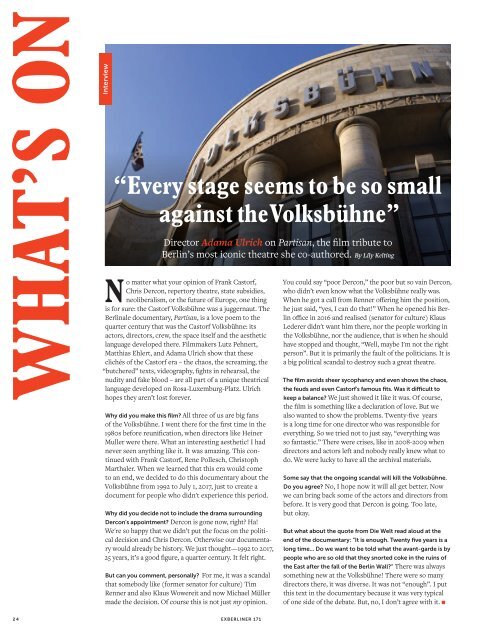You also want an ePaper? Increase the reach of your titles
YUMPU automatically turns print PDFs into web optimized ePapers that Google loves.
Interview<br />
“Every stage seems to be so small<br />
against the Volksbühne”<br />
Director Adama Ulrich on Partisan, the film tribute to<br />
Berlin’s most iconic theatre she co-authored. By Lily Kelting<br />
No matter what your opinion of Frank Castorf,<br />
Chris Dercon, repertory theatre, state subsidies,<br />
neoliberalism, or the future of Europe, one thing<br />
is for sure: the Castorf Volksbühne was a juggernaut. The<br />
Berlinale documentary, Partisan, is a love poem to the<br />
quarter century that was the Castorf Volksbühne: its<br />
actors, directors, crew, the space itself and the aesthetic<br />
language developed there. Filmmakers Lutz Pehnert,<br />
Matthias Ehlert, and Adama Ulrich show that these<br />
clichés of the Castorf era – the chaos, the screaming, the<br />
“butchered” texts, videography, fights in rehearsal, the<br />
nudity and fake blood – are all part of a unique theatrical<br />
language developed on Rosa-Luxemburg-Platz. Ulrich<br />
hopes they aren’t lost forever.<br />
Why did you make this film? All three of us are big fans<br />
of the Volksbühne. I went there for the first time in the<br />
1980s before reunification, when directors like Heiner<br />
Muller were there. What an interesting aesthetic! I had<br />
never seen anything like it. It was amazing. This continued<br />
with Frank Castorf, Rene Pollesch, Christoph<br />
Marthaler. When we learned that this era would come<br />
to an end, we decided to do this documentary about the<br />
Volksbühne from 1992 to July 1, 2017, just to create a<br />
document for people who didn't experience this period.<br />
Why did you decide not to include the drama surrounding<br />
Dercon's appointment? Dercon is gone now, right? Ha!<br />
We're so happy that we didn’t put the focus on the political<br />
decision and Chris Dercon. Otherwise our documentary<br />
would already be history. We just thought—1992 to 2017,<br />
25 years, it’s a good figure, a quarter century. It felt right.<br />
But can you comment, personally? For me, it was a scandal<br />
that somebody like (former senator for culture) Tim<br />
Renner and also Klaus Wowereit and now Michael Müller<br />
made the decision. Of course this is not just my opinion.<br />
You could say “poor Dercon,” the poor but so vain Dercon,<br />
who didn’t even know what the Volksbühne really was.<br />
When he got a call from Renner offering him the position,<br />
he just said, “yes, I can do that!” When he opened his Berlin<br />
office in 2016 and realised (senator for culture) Klaus<br />
Lederer didn't want him there, nor the people working in<br />
the Volksbühne, nor the audience, that is when he should<br />
have stopped and thought, “Well, maybe I'm not the right<br />
person”. But it is primarily the fault of the politicians. It is<br />
a big political scandal to destroy such a great theatre.<br />
The film avoids sheer sycophancy and even shows the chaos,<br />
the feuds and even Castorf's famous fits. Was it difficult to<br />
keep a balance? We just showed it like it was. Of course,<br />
the film is something like a declaration of love. But we<br />
also wanted to show the problems. Twenty-five years<br />
is a long time for one director who was responsible for<br />
everything. So we tried not to just say, “everything was<br />
so fantastic.” There were crises, like in 2008-2009 when<br />
directors and actors left and nobody really knew what to<br />
do. We were lucky to have all the archival materials.<br />
Some say that the ongoing scandal will kill the Volksbühne.<br />
Do you agree? No, I hope now it will all get better. Now<br />
we can bring back some of the actors and directors from<br />
before. It is very good that Dercon is going. Too late,<br />
but okay.<br />
But what about the quote from Die Welt read aloud at the<br />
end of the documentary: “It is enough. Twenty five years is a<br />
long time... Do we want to be told what the avant-garde is by<br />
people who are so old that they snorted coke in the ruins of<br />
the East after the fall of the Berlin Wall?” There was always<br />
something new at the Volksbühne! There were so many<br />
directors there, it was diverse. It was not “enough”. I put<br />
this text in the documentary because it was very typical<br />
of one side of the debate. But, no, I don’t agree with it. ■<br />
24 EXBERLINER <strong>171</strong>

















